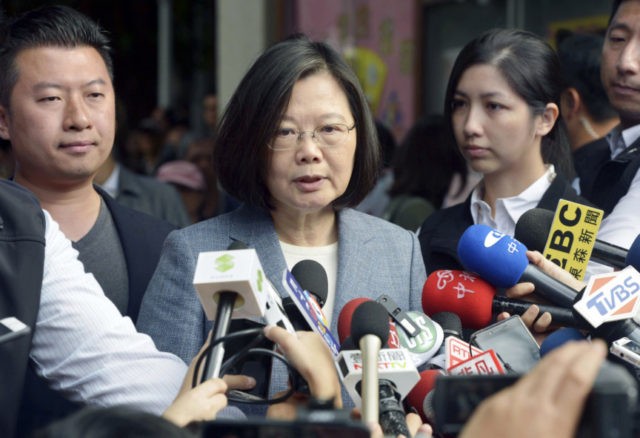The government of Taiwan announced Thursday that it would begin a live-fire military drill next week simulating an invasion to test a line of homemade launch rocket systems. Taiwan’s military would continue similar drills throughout the year to enhance combat readiness, the armed forces said.
The South China Morning Post, which reported on next week’s exercise, stated that officials did not want to equate the scheduling of a series of military drills with a speech last week by Chinese Communist Party leader Xi Jinping threatening to use force to invade and colonize Taiwan. While Taiwan is a sovereign, representative democracy, China’s leaders consider it a breakaway province. Xi announced that reunification with China was “inevitable” for the island last week, while his military leaders threatened to treat those who acknowledge Taiwan’s independence as “war criminals” in the event of an invasion.
The Post translated an announcement by Taiwan’s 10th Army Corps confirming that the drill would occur in central Taiwan on January 17 and “will involve weapons launched from the air, sea, and land.” The newspaper lists those weapons as including “indigenous Thunderbolt-2000 multiple launch rocket systems along with a number of rockets, AH-64E Apache attack helicopters, Hellfire missiles, and various types of cannons.”
The report also cites a source insisting that “the drill has nothing to do with the recent speech by … Xi Jinping. It was planned long before Xi made the ‘one country, two systems’ comment earlier this month.”
Xi delivered a speech at the opening of the new year announcing that he would pursue the replacement of “One China,” a policy that makes it impossible for third-party countries to keep diplomatic ties with both China and Taiwan, with “One Country, Two Systems,” the policy currently in place in Hong Kong.
The latter policy does not allow Hong Kong any diplomacy whatsoever, instead allowing it to exist only as a province of China with slightly laxer economic policies. China has eroded many of the “One Country, Two Systems” provisions under Xi, triggering widespread protests by blocking anti-Beijing candidates from running for office and, most recently, weighing a law that would make it illegal to “disrespect” the Chinese national anthem.
“One Country, Two Systems” is extremely unpopular in Taiwan. A survey published Wednesday conducted by Taiwan’s Cross-Straits Policy Association found that over 80 percent of Taiwanese reject the idea of adopting this policy over the status quo.
“Reunification is a historical trend and it is the right path. Taiwan independence is an adverse current of history and is a dead end,” Xi announced in his speech last week. “We make no promise to abandon the use of force, and retain the option of taking all necessary measures.”
On Wednesday, Chinese Lieutenant General He Lei told reporters that the Communist Party had already decided that anyone who supports Taiwan’s sovereignty currently “would be classified as war criminals that must be punished if the Chinese mainland is forced to deal with the Taiwan question by force.”
Both He and Xi warned the United States, without referring to the country by name, to stay out of any dispute with Taiwan. Washington adheres by “One China,” refusing to formally acknowledge Taiwan’s sovereignty, but maintains diplomatic relations with Taipei and hosts a Taiwanese diplomatic office in the country.
Tsai responded directly to Xi in a speech last week, urging the Communist Party to step aside and allow the existence of a representative democracy like Taiwan’s, rather than attempt to bully Taiwan into authoritarianism.
“Democratic values are the values and way of life that Taiwanese cherish, and we call upon China to bravely move towards democracy,” Tsai said. “This is the only way they can truly understand Taiwanese people’s ideas and commitments.”
She added that it would be healthy for China to “face the reality of the existence of the Republic of China (Taiwan), and not deny the democratic system that the people of Taiwan have established together.”
“I want to remind the Beijing authorities that a superpower must act with the demeanor and take the responsibility of a superpower,” she concluded, “and international society is watching China to see if it can make changes and become a trustworthy partner.”
Tsai once again attacked the Chinese government on Wednesday during a speech at the Ministry of Justice Investigation Bureau (MJIB), a federal criminal agency. This time, Tsai accused the Chinese of sending citizens into Taiwan as tourists or students and instructing them with espionage.
“Taiwan welcomes friends from the mainland to visit, and two to three million mainland visitors travel to Taiwan each year, but ‘someone’ has tried to made use of our free policy by sending people to Taiwan for espionage activities, which has seriously threatened our national security,” she said in her address. “They have used their participation and interaction at functions and events as a cover to collect intelligence, recruit people to conduct espionage activities and develop spy networks in Taiwan.”
Tsai thanked the MJIB for their work in combatting these activities, stating that the bureau arrested 174 people last year on evidence of spying for China.

COMMENTS
Please let us know if you're having issues with commenting.